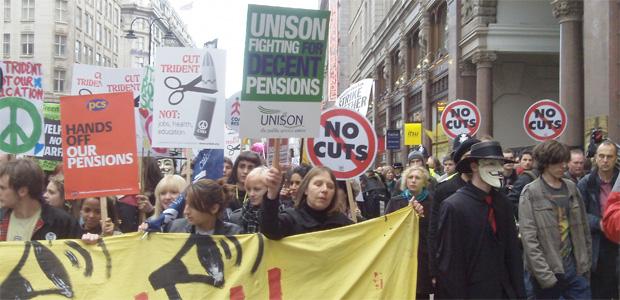Public Sector Strike Rallies Held Across UK
Unions accuse the government of failing to participate in proper negotiations in recent weeks, a claim rejected by ministers. (Photo: Laura Lynch)
As hundreds of rallies were held in cities and towns across the UK, the Trades Union Congress (TUC) estimated that 30,000 protesters had turned out in Birmingham and some 25,000 in London.
The government disputed that two million people had joined the action, with Prime Minister Cameron saying “it looks like something of a damp squib” at Prime Minister’s Questions.
“Our rigorous contingency planning has been working well,” Cabinet Minister Francis Maude said later in the day.
“Throughout the day it has limited the impact of the strikes significantly and as a result the majority of key public services have remained open.”
TUC General Secretary Brendan Barber accused the government of “rhetoric today … as predictable as it has been shallow.”
“The biggest strike in a generation cannot be dismissed as a damp squib,” he said.
“Uniting so many people in such strong opposition to their pension plans should give the government pause for thought. They now need to give the negotiations real content. Unions wants to achieve a fair settlement, but it takes two to reach a deal.”
In the Commons, Prime Minister Cameron said he thought the government had made a “very reasonable, very fair offer to public sector workers.”
“I don’t want to see any strikes, I don’t want to see schools closed, I don’t want to see problems at our borders, but this government has to make responsible decisions,” he said.
But union leaders accused the government of failing to engage in proper negotiations in recent weeks.
Unison general secretary Dave Prentis said that the last time unions met Treasury ministers was Nov. 2, adding that “this idea that negotiations are continuing is just not true.”
Maude disputed that, saying formal discussions with the civil service unions took place on Tuesday and that talks would take place with teaching unions on Thursday and with health unions on Friday.
A TUC spokesperson responded: “There have been informal exchanges but nothing that could be described as negotiations at the national level.”
Chris Keates, head of the teachers’ union NASUWT, said: “We’re in this position today simply because the government had not entered into genuine negotiations at an earlier stage.”
Labor leader Ed Miliband said he had “huge sympathy” for people whose lives were disrupted by the strike.
But he said he was “not going to condemn the dinner ladies, nurses, teachers who have made the decision to go on strike because they feel they have been put in an impossible position by a government that has refused to negotiate properly”.
